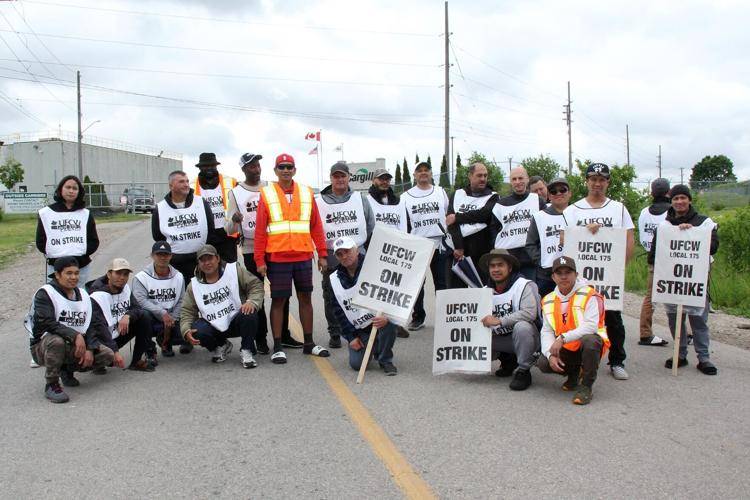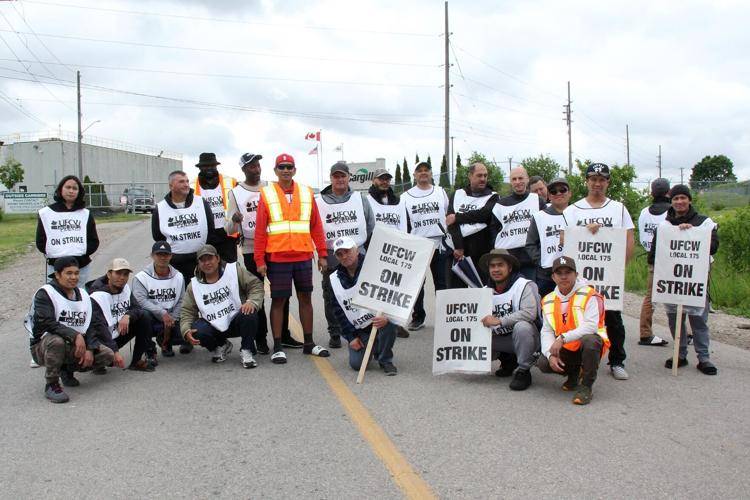Workers Strike at Cargill Meat Plant in Canada Over Pay Disputes
Employees at Cargill’s meat processing facility in Guelph, Ontario, have initiated a strike over unresolved pay disputes. Nearly 1,000 workers from the Dunlop plant left their posts on May 27, following the rejection of a proposed settlement negotiated between Cargill and the United Food and Commercial Workers Union (UFCW), which represents the employees.
Background of the Strike
The strike action came after 82% of the workers rejected the settlement, which had been crafted through extensive negotiations between the agribusiness giant and UFCW. Earlier in April, an overwhelming 99% of the workforce had given the UFCW negotiating committee a strike mandate, underscoring the depth of discontent among the employees.
Workers’ Concerns
Several key issues were raised during the negotiations, primarily revolving around rising living costs and the controversial reduction of the $2 an hour pandemic pay. Workers argued that this pay cut was implemented while the pandemic was still affecting their lives and safety. The UFCW highlighted that these concerns were central to the workers’ decision to reject the settlement.
Cargill’s Response
In response to the strike, a Cargill spokesperson expressed disappointment, stating, “The unanimously recommended settlement included a wage increase in each year of the 4-year agreement, with over a 9.3% increase in the first year alone, retroactive pay from January 1, 2024, benefit enhancements, and a signing bonus.” The spokesperson emphasized that the proposal was designed to honor the skills and dedication of the Guelph workforce. They also noted concerns about the potential hardships that the labor disruption could bring to employees and customers.
Cargill has indicated plans to shift production to other facilities within its supply chain to minimize disruptions, aiming to maintain a steady supply of meat products to its customers during the strike.
Impact on Operations
Cargill’s Dunlop site employs approximately 950 people and processes around 1,500 head of cattle daily. The facility produces private-label case-ready meat products for retail customers in Canada, including poultry, pork, beef sausages, and ground beef. The strike’s impact on production and supply chain logistics could be significant, depending on the duration of the labor dispute.
Union’s Standpoint
Kelly Tosato, president of UFCW’s Local 175 branch, which represents the Dunlop site workers, commented on the strike, stating, “Our members at Cargill Dunlop are an integral part of a vital supply chain that helps keep food on the table for people every day. The decision to go on strike is never easy, but these members aren’t satisfied with what the company has brought to the table. We will support them until we can achieve a deal that reflects their hard work and commitment to creating quality food products.”
The UFCW criticized Cargill for failing to provide an offer strong enough to address the workers’ needs, despite the company’s mission to “nourish the world.” The union argued that Cargill’s inability to offer adequate pay and benefits was contradictory to its public image and mission statement.
Broader Implications
The strike at Cargill’s Dunlop plant highlights ongoing labor tensions within the meat processing industry, where workers have often faced challenging working conditions, especially during the COVID-19 pandemic. The dispute underscores broader issues related to worker compensation, safety, and the rising cost of living, which continue to be significant points of contention in labor negotiations across various sectors.
Conclusion
As the strike continues, both Cargill and the UFCW will need to find a resolution that addresses the workers’ concerns while maintaining the company’s operational stability. The outcome of this dispute could set a precedent for future labor negotiations within the meat processing industry and beyond. The dedication and resilience of the workers at Cargill’s Dunlop plant serve as a reminder of the essential role they play in the food supply chain, and their voices will likely continue to shape the industry’s labor landscape in the coming years.
Related: Why 1000 Cargill Workers are Striking?



